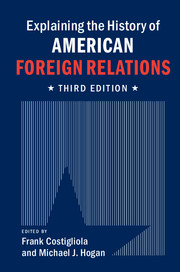Book contents
- Frontmatter
- Dedication
- Contents
- List of figures
- List of contributors
- Introduction
- 1 Theories of International Relations
- 2 National security
- 3 Corporatism: from the new era to the age of development
- 4 Explaining political economy
- 5 Diplomatic history after the big bang: using computational methods to explore the infinite archive
- 6 Development and technopolitics
- 7 Nonstate actors
- 8 Legal history as foreign relations history
- 9 Domestic politics
- 10 The global frontier: comparative history and the frontier-borderlands approach
- 11 Considering borders
- 12 The privilege of acting upon others: the middle eastern exception to anti-exceptionalist histories of the US and the world
- 13 Nationalism as an umbrella ideology
- 14 Nation Branding
- 15 Shades of sovereignty: racialized power, the United States and the world
- 16 Gendering American foreign relations
- 17 The religious turn in diplomatic history
- 18 Memory and the study of US foreign relations
- 19 The senses
- 20 Psychology
- 21 Reading for emotion
- Index
8 - Legal history as foreign relations history
Published online by Cambridge University Press: 05 March 2016
- Frontmatter
- Dedication
- Contents
- List of figures
- List of contributors
- Introduction
- 1 Theories of International Relations
- 2 National security
- 3 Corporatism: from the new era to the age of development
- 4 Explaining political economy
- 5 Diplomatic history after the big bang: using computational methods to explore the infinite archive
- 6 Development and technopolitics
- 7 Nonstate actors
- 8 Legal history as foreign relations history
- 9 Domestic politics
- 10 The global frontier: comparative history and the frontier-borderlands approach
- 11 Considering borders
- 12 The privilege of acting upon others: the middle eastern exception to anti-exceptionalist histories of the US and the world
- 13 Nationalism as an umbrella ideology
- 14 Nation Branding
- 15 Shades of sovereignty: racialized power, the United States and the world
- 16 Gendering American foreign relations
- 17 The religious turn in diplomatic history
- 18 Memory and the study of US foreign relations
- 19 The senses
- 20 Psychology
- 21 Reading for emotion
- Index
Summary
“Why did the law matter?” an eminent diplomatic historian once asked of a legal historian. Wouldn't an episode in US international history have turned out the same way even if law had not been part of the story?
This kind of question has been central to the traditional divide between legal and foreign relations history. Skepticism about law as a causal force is the common justification for not focusing on law. That skepticism is based on methodological assumptions about what drives diplomatic history. But just as legal historians have not always been clear enough about the reasons their subject matters, foreign relations historians have been lax in their justifications for neglecting law, even as the role of law and lawyers in foreign relations history has expanded through the twentieth century and after.
This divide is driven, in part, through limitations in the way historians sometimes view law, and the way lawyers sometimes view history. At times, law is thought to be rather one-dimensional: if the law requires X, and X doesn't happen, then law has not had an impact. As I will explain, this way of thinking about law is too simple. In some contexts, lawyers (though generally not legal historians) approach history in a parallel, oversimplified way. History is reified into a stable and knowable past, as compared to the webs of evidence that historians sift and interpret. In the context of constitutional originalism, for example, if the past is knowable in a finite way, then past understandings can constrain the present, enabling “history” to be an anchor protecting against contemporary judicial activism. Neither law nor history is as stable as these approaches suggest. And even though it can often be argued that law, by itself, did not produce a particular outcome, this can be said of many important variables in the history of foreign relations.
In this chapter, I will show that law is already present in some aspects of foreign relations history. Using human rights as an example, I will explore the way in which periodization of legal histories is tied to assumptions and arguments about causality. I will illustrate the way law has worked as a tool in international affairs, and the way law makes an indelible mark, or acts as a legitimizing force, affecting what historical actors imagine to be possible.
- Type
- Chapter
- Information
- Explaining the History of American Foreign Relations , pp. 135 - 150Publisher: Cambridge University PressPrint publication year: 2016
- 4
- Cited by



